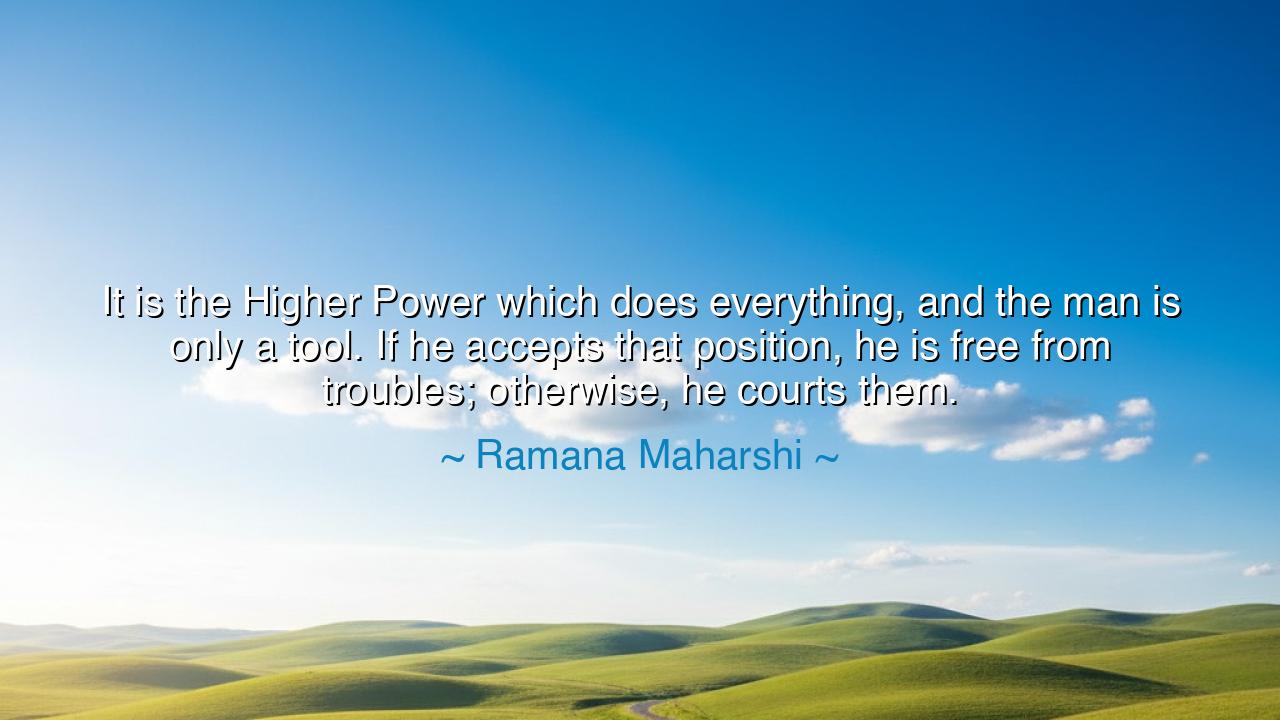
It is the Higher Power which does everything, and the man is
It is the Higher Power which does everything, and the man is only a tool. If he accepts that position, he is free from troubles; otherwise, he courts them.






In these luminous words, Ramana Maharshi speaks to the profound truth of surrender and the recognition of a Higher Power in the unfolding of life. He observes that all actions and events are ultimately carried out by this greater force, and that man is but a tool through which the divine operates. To accept this position is to find freedom from troubles, for one ceases to struggle against the currents of existence. To resist this truth, Maharshi warns, is to invite suffering, as the mind battles against the inevitable flow of life.
The origin of this teaching lies in Maharshi’s deep exploration of Advaita Vedanta, the non-dual philosophy that emphasizes the unity of all existence and the illusory nature of ego. Through years of meditation and inquiry at the sacred mountain of Arunachala, he realized that liberation comes not from striving to control the world, but from recognizing oneself as an instrument of the divine will. This insight transcends the personal self, revealing the spiritual power of humility, surrender, and inner stillness.
History provides vivid illustrations of this principle. Consider Mahatma Gandhi, whose profound commitment to nonviolence and truth was guided by a deep faith in a higher moral order. Gandhi acted as a tool of justice and righteousness, trusting that his efforts, though seemingly small, were part of a larger cosmic design. By surrendering personal ambition and aligning with a greater purpose, he achieved both inner peace and transformative social impact, embodying Maharshi’s teaching that acceptance of one’s role frees the soul from unnecessary turmoil.
Maharshi’s words also emphasize the ethical and psychological dimension of surrender. To act with humility as a tool of the Higher Power is not to renounce responsibility, but to release the weight of attachment to outcomes. One learns to perform actions with diligence, yet without anxiety over results, trusting that life unfolds according to a greater intelligence. This is a lesson echoed across spiritual traditions: the release of ego brings clarity, freedom, and serenity.
Ultimately, this quote is a meditation on faith, surrender, and liberation. Ramana Maharshi teaches future generations that true freedom arises when man recognizes his position as an instrument of the divine, acting in harmony with the currents of existence rather than against them. Let this wisdom endure: to resist the Higher Power is to court suffering, but to embrace one’s role as a tool is to walk the path of peace, courage, and unshakable equilibrium, a life in tune with the eternal rhythm of the cosmos.






TTDo Thi Thanh Thao
This quote brings up a deep philosophical question for me: if everything is guided by a Higher Power, is effort still meaningful? Are we supposed to strive, or simply allow things to unfold? It’s an elegant teaching, but it challenges the very core of human motivation. Perhaps the lesson is about intention — to act without attachment. Still, I wonder how one lives this truth while remaining engaged with the world.
THNguyen Thi Thu Hang
I feel drawn to the serenity behind this thought. It seems to promise freedom from anxiety and ego by recognizing that something greater is at work. But isn’t it incredibly hard to maintain that awareness when life feels chaotic or unjust? How do we trust a Higher Power during suffering or tragedy? I’d like to know how one cultivates such deep faith consistently, especially when life feels unfair.
DDDuy Duc
I find this message profoundly spiritual, yet I’m curious about how it fits with modern life, where self-reliance and ambition are so highly valued. Can someone genuinely follow this perspective and still thrive in a competitive world? Or does true peace come from letting go of worldly definitions of success altogether? It feels like a conflict between spiritual surrender and societal expectation — I’d love to hear thoughts on that tension.
VHnguyen truong viet huy
This teaching seems to encourage peace through surrender, but I can’t help wondering — isn’t detachment sometimes mistaken for apathy? How does one truly surrender to a Higher Power without becoming passive or indifferent? Maybe the key lies in the attitude of humility rather than inaction, but it’s hard to strike that balance. What does it really mean to act while knowing you’re not the ultimate doer?
TTLe Triet Thuc
Reading this, I can sense deep spiritual wisdom, but I struggle with the concept of being merely a tool. Does this view mean that human free will is just an illusion? If so, how can we genuinely learn, grow, or feel responsible for our actions? It’s fascinating but also unsettling to think that the feeling of control might just be a misunderstanding of how life truly operates.